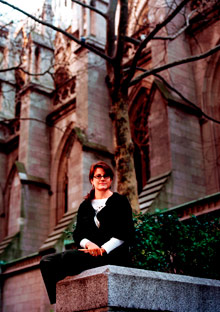The Doubter's Dilemma

Photo: Ryan Dorsett
To pray or not to pray? To believe or not to believe? And how to explain the things that look suspiciously like miracles? Kelly Corrigan speaks for a generation of people "pulsing with thankfulness" but not sure they can give it up to God.
My mother is fond of telling me I'm overthinking it—"it" being anything from the virtues of organic mulch for my flower beds to which booster seats to buy for my daughters—so you can imagine how she feels about my religious ambivalence. While it's not quite true to say she was 30 with three kids before she met someone who wasn't Catholic, it's close enough. Perhaps as a consequence, she is not a woman who has frittered away her days critiquing her religion. Instead she prays, mostly for her children, who she so hoped would inherit her bulletproof faith but who are more likely to drive away with her navy blue Buick and a leftover case of Chardonnay she bought at a discount in Delaware. Both my parents shudder over our discerning, noncommittal generation that has something to say about everything but nowhere to go on Sunday mornings.
I envy my parents' faith. Supplication, I've often thought, must be easier on the body than Tums and Ambien. And how contenting it must be to believe that someday everyone you love will be in one place and will stay there forever. Who wouldn't want that destiny? But for all its comforting appeal, I rarely go to church and have read only a few chapters of the Bible. Even when disaster struck four years ago, I did not fall to my knees and petition the God of my childhood.
In autumn 2004, both my father and I were diagnosed with late-stage cancer. I was 36, and the seven-centimeter tumor behind my nipple was technically my second cancer. (In my mid-20s, I'd had a melanoma as big as a pencil eraser removed from my calf, leaving a little divot and a long scar that remind me to use sunblock and stay in the shade at midday.) My dad was 74, and the scattered tumors around his bladder marked round three for him.
The day my doctor called with the diagnosis, I hung up the phone, looked over the heads of my kids, and mouthed to my husband, "It's cancer." Then, after a long hug, a cold Corona, and a cigarette (I had squirreled away a half-smoked pack after a party the year before and for reasons I can't explain, I couldn't wait to suck down a Merit Ultra Light that afternoon), we went to the computer and started searching for information on "invasive ductal carcinoma." My father got his diagnosis in person; after thanking the doctor and scheduling a slew of tests, he and my mother slid into the Buick and drove down to St. Colman's, their favorite little church, for noon Mass. They gave it to God; we gave it to Google.
Over the course of a year, my dad and I both got better, and, especially in his case, people said it was miraculous. At the very least, it was unexpected. Perhaps even unexplainable, though not to Mom, who summed it up in one word: prayer. "People around the world were praying for your father," she explained ("around the world" referring primarily to a high school friend of mine who lived in Moscow and had always been fond of my dad).
I had both always prayed and never prayed, which is to say that I often found myself in bed at the end of a day saying to no one in particular, "Thank you for this good man beside me and those girls in the other room." But I had not beseeched God to make me well, had not begged God for my father's life. Among other things, I didn't want to be—to borrow from sixth-grade parlance—a user, a phony who thought she could get what she wanted by conveniently nuzzling up to someone she usually snubbed.



